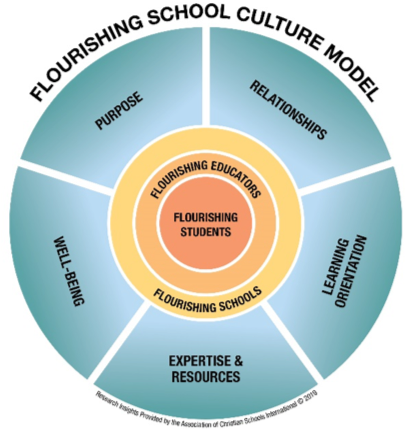 How do Christian schools flourish? What elements of school culture contribute to flourishing, and do some elements matter more than others? Is there a road map to school flourishing that can be validated by empirical research in Christian schools? In 2018, ACSI Research sought to answer these questions through rigorous research on Christian school cultures. The results of this research—shared in the report Flourishing Schools: Research on Christian School Culture and Community—are groundbreaking.
How do Christian schools flourish? What elements of school culture contribute to flourishing, and do some elements matter more than others? Is there a road map to school flourishing that can be validated by empirical research in Christian schools? In 2018, ACSI Research sought to answer these questions through rigorous research on Christian school cultures. The results of this research—shared in the report Flourishing Schools: Research on Christian School Culture and Community—are groundbreaking.
The Research Tool
At the center of the study is a powerful new research tool, the Flourishing School Culture Instrument (FSCI). In total, the FSCI tested 1,445 discrete variables across seven different survey groups: students, parents, alumni, teachers, leaders/administrators, support staff, and board members. Questions for the FSCI were formed based on catalogued findings from an extensive review of relevant prior research and literature, as well as findings from a meta-analysis of dozens of leading Christian schools’ expected student outcomes, which fell into six major categories (spiritual, academic, community, excellence, impact, and servanthood).
Between fall 2018 and spring 2019, over 15,000 survey responses were collected from these groups, representing 65 Christian schools of diverse size and geographic location, thereby making the FSCI the largest study of flourishing in Christian schools to date. The statistical power behind the FSCI, particularly linkages to outcomes (including, but not limited to, student achievement data), enables the instrument to be a predictive (versus correlative) measure.
The Flourishing School Culture Model (FSCM)
 Analysis of the FSCI data resulted in over 40 validated constructs that are predictive of flourishing. These constructs were mapped onto the first-ever research-based model of Christian school flourishing—the Flourishing School Culture Model (FSCM). The FSCM clusters the validated constructs for all seven survey groups into five domains of flourishing:
Analysis of the FSCI data resulted in over 40 validated constructs that are predictive of flourishing. These constructs were mapped onto the first-ever research-based model of Christian school flourishing—the Flourishing School Culture Model (FSCM). The FSCM clusters the validated constructs for all seven survey groups into five domains of flourishing:
Purpose: A commitment on the part of all school constituencies to the central purposes of Christian education—such as holistic teaching, integrated worldview, spiritual formation, discipleship, and family-school partnership—are strongly predictive of flourishing outcomes.
Relationships: Trust-filled, supportive, and authentic relationships between all school constituencies, as well as with the surrounding community, are key to flourishing outcomes (e.g., between leaders and teachers, leaders and the board, parents and teachers, teachers and students, students and peers, school leadership and the community, and the school itself with the community).
Learning Orientation: A school culture in which educators are committed to ongoing learning and improvement is predictive of flourishing not only for the school and educators, but also for students. For teachers, this includes best practices in feedback and collaboration, high-quality professional development, and individualized instruction. For school leadership, this entails using systems thinking to develop a culture of improvement, which is both focused on student outcomes and is data driven.
Expertise and Resources: Flourishing is connected to excellence in educational and school management practices. Educationally, this includes hiring qualified staff, providing effective and orderly classroom environments where students are deeply engaged in learning, and responding effectively to special needs. Sufficient school resources—as well as board-level strengths in resource planning—are predictive of school flourishing, as are (conversely) resource constraints that hinder schools from engaging in improvement processes.
Well-Being: For both leaders and teachers at Christian schools, stress is a key factor that impacts flourishing; likewise, healthy living and developing resilience is predictive of student flourishing. This domain and related constructs demonstrate that the well-being of educators and students is not a secondary concern—but rather is predictively linked—to flourishing outcomes.
Taken together, these five domains provide a compelling and comprehensive picture of the areas in which Christian schools can focus their efforts and resources in order to promote a flourishing school culture and community.
Linkages with Outcomes
Analysis of connections between these domains and specific flourishing outcomes supported many of the school improvement practices typically undertaken in Christian schools (e.g., improving staff qualifications through hiring practices, promoting student well-being, responding well to students’ learning needs, providing ample classroom resources, and ensuring teachers develop caring relationships with students).
Some findings, however, suggested schools pursue other efforts to promote flourishing—such as leaders’ engaging the larger community, ensuring teachers are oriented toward best practice, and promoting teachers’ engagement of students in deeper learning—with unexpected yet strong linkages to outcomes like spiritual formation and reduced teacher turnover. Along with the study’s methodology, these linkages are discussed in detail in the national report, Flourishing Schools: Research on Christian School Culture and Community.
Future Steps
Future FSCI administrations, beginning in early spring 2020, will strengthen both the usefulness of findings for schools and the data set that informs the predictive nature of the FSCI. In addition to the national findings, participating schools receive a detailed report that identifies their school’s unique strengths, opportunities for growth, and benchmark scores against the national data set (schools that are interested in administering FSCI can register here).
Future reports this coming spring (see here) will further unpack leadership constructs related to school flourishing. In the meantime, the national report details initial FSCI findings and the FSCM model for Christian educators which, when taken together, provide measurable signposts on a road map toward flourishing Christian schools.
About the Authors
 Dr. Lynn Swaner is the Chief Strategy and Innovation Officer at ACSI, where she leads initiatives and develops strategies to address compelling questions and challenges facing Christian education. Prior to joining ACSI she served as a Christian school administrator and a graduate professor of education. Dr. Swaner serves as a Cardus Senior Fellow and is the lead editor of the books MindShift: Catalyzing Change in Christian Education and PIVOT: New Directions for Christian Education, co-author of Bring It to Life: Christian Education and the Transformative Power of Service-Learning, and editor of the ACSI blog. She received her EdD from Teachers College, Columbia University, in New York City. She can be reached via email at lynn_swaner@acsi.org.
Dr. Lynn Swaner is the Chief Strategy and Innovation Officer at ACSI, where she leads initiatives and develops strategies to address compelling questions and challenges facing Christian education. Prior to joining ACSI she served as a Christian school administrator and a graduate professor of education. Dr. Swaner serves as a Cardus Senior Fellow and is the lead editor of the books MindShift: Catalyzing Change in Christian Education and PIVOT: New Directions for Christian Education, co-author of Bring It to Life: Christian Education and the Transformative Power of Service-Learning, and editor of the ACSI blog. She received her EdD from Teachers College, Columbia University, in New York City. She can be reached via email at lynn_swaner@acsi.org.
 Dr. Charlotte Marshall served previously as the Senior Researcher at ACSI. Her background includes a decade of research examining individual and community well-being in academic, corporate, and church communities. Deeply rooted in Christian values, she has the ability to lead research projects strategically and empathetically. Prior to joining ACSI, she served as a professor of psychology and academic researcher. She can be reached via email at charlotte_marshall@acsi.org.
Dr. Charlotte Marshall served previously as the Senior Researcher at ACSI. Her background includes a decade of research examining individual and community well-being in academic, corporate, and church communities. Deeply rooted in Christian values, she has the ability to lead research projects strategically and empathetically. Prior to joining ACSI, she served as a professor of psychology and academic researcher. She can be reached via email at charlotte_marshall@acsi.org.

